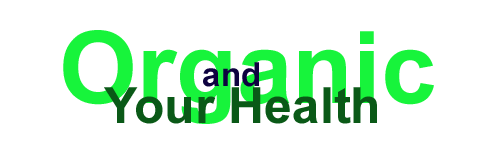| Organic textile Logos: | |
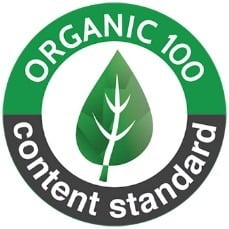 | Certified to Organic Exchange (OE) 100 Standard / Organic Content Standard The Organic 100 Content Standard (OCS) seal, which has replaced the Certified to Organic Exchange (OE) 100 seal is an organic textile seal for textiles/fibers issued from 100% organic agriculture. The seal is issued by the Textile Exchange (formerly the Organic Exchange) and is accepted globally. |
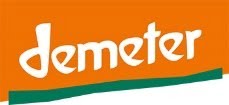 | Demeter The Demeter seal is issued by Demeter International and certifies food, cosmetic, and textile products that are grown in accordance with biodynamic practices and principles. |
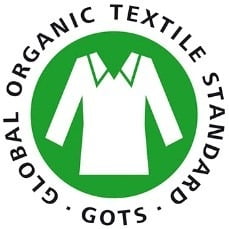 | Global Organic Textile Standard (GOTS) The Global Organic Textile Standard (GOTS) is an international seal and certifying body for textiles whose materials were grown using organic agricultural practices and whose processing meets environmental and social criteria. GOTS is comprised of four reputed member organisations, namely OTA (USA), IVN (Germany), Soil Association (UK) and JOCA (Japan). |
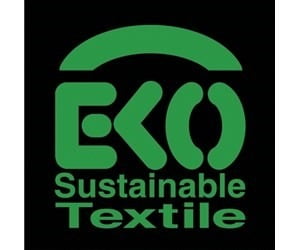 | EKO Sustainable Textile The square EKO quality symbol is an international quality symbol for Control Union Certifications sustainable textile products. It is used when raw materials originate from organic cultivation and are processed using the sustainable textile production methods. |
|
| |
| Ecolabel Textile Logos | |
 | Global Recycle Standard (GRS) The Global Recycle Standard (GRS) was developed by the Textile Exchange for global textile products made with recycled content. The GRS seal ensures traceability as well as the use of ethical trading and sustainable manufacturing practices. |
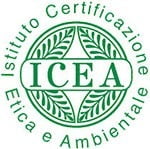 | Istituto per la Certificazione Etica e Ambientale (ICEA) Certified The Istituto Certificazione Etica e Ambientale (ICEA) is an Italian group of ecolabels that covers a wide range of industries such as agricultural products & food, cosmetics, household cleaning products, textiles, building materials and wine. ICEA certifies environmentally friendly consumer products and products grown using organic agricultural standards. The seals are accepted across Europe. |
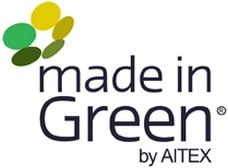 | Made in Green by AITEX (miG) Made in Green by AITEX (miG) is a textile ecolabel with a focus on fair labor standards and environmentally friendly manufacturing practices issued by the Textile Industry Research Association (AITEX). The seal is accepted across Europe. |
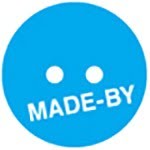 | MADE-BY MADE-BY is a textile ecolabel and program with a focus on fair labor standards and environmentally friendly manufacturing practices for the apparel industry. It is accepted across Europe. |
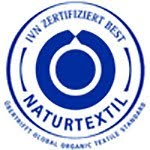 | Naturtextil IVN certified BEST Naturtextil IVN certified BEST is an ecolabel for textiles with a focus on environmentally friendly manufacturing practices. The seal is issued by the International Association of Natural Textile Industry (IVN) and is accepted globally. |
 | OEKO-Tex Standard 100 The Oeko-Tex Standard 100 is a globally accepted ecolabel for textiles manufactured without harsh or toxic chemicals. |
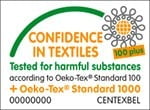 | OEKO-Tex Standard 100Plus The OEKO-TEX Standard 100Plus is a globally accepted ecolabel for textiles manufactured without harsh or toxic chemicals and using environmentally friendly and ethically sound manufacturing practices. |
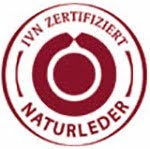 | Pure natural leather: Naturleder IVN certified Pure natural leather: Naturleder IVN certified is an ecolabel for leather goods with a focus on environmentally friendly manufacturing practices. The seal is issued by the International Association of Natural Textile Industry (IVN) and is accepted globally. |
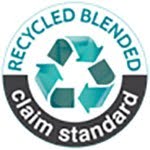 | Recycled Claim Standard The Recycled Claim Standard (RCS) was developed by the Textile Exchange for global textile products made with recycled content to ensure traceability and provide documentation for the amount of recycled material in the final product. |
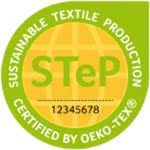 | Sustainable Textile Production (STeP) Replacing the OEKO-TEX 100, Sustainable Textile Production (STeP) is a globally accepted ecolabel for textiles manufactured without harsh or toxic chemicals and using environmentally friendly and ethical manufacturing practices. |
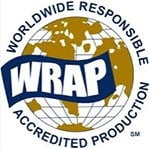 | Worldwide Responsible Accredited Production (WRAP) Certification Worldwide Responsible Accredited Production (WRAP) is a seal and program for textiles with a focus on ethical trading, fair labor and environmentally friendly practices. The seal is accepted globally. |
The most popular certification logos in organic clothing are as follows:
The Global Organic Textile Standard (GOTS)
The Global Organic Textile Standard (GOTS) is the worldwide leading textile processing standard for organic fibres, including ecological and social criteria, backed up by independent certification of the entire textile supply chain.
Certification of the entire textile supply chain (GOTS)
- Fibre producers (farmers) must be certified according to a recognised international or national organic farming standard that is accepted in the country where the final product will be sold
- Certifiers of fibre producers must be internationally recognised through ISO 65/17065, NOP and/or IFOAM accreditation. They also must be accredited to certify according to the applicable fibre standard
- Operators from post-harvest handling up to garment making and traders have to undergo an onsite annual inspection cycle and must hold a valid GOTS scope certificate applicable for the production/trade of the textiles to be certified
- Certifiers of processors, manufacturers and traders must be internationally accredited according to ISO 65/17065 and must hold a ‘GOTS accreditation’ in accordance with the rules as defined in the ‘Approval Procedure and Requirements for Certification Bodies’
For more information please see: https://www.global-standard.org/the-standard/general-description.html
The STANDARD 100 by OEKO-TEX® is a worldwide consistent, independent testing and certification system for raw, semi-finished, and finished textile products at all processing levels, as well as accessory materials used. Examples of articles that can be certified: raw and dyed/finished yarns, woven and knitted fabrics, accessories, such as buttons, zip fasteners, sewing threads or labels, ready-made articles of various types (garments of all types, domestic and household textiles, bed linen, terry products and much more).
 the STANDARD 100 by OEKO-TEX® takes account of:
the STANDARD 100 by OEKO-TEX® takes account of:
- Important legal regulations, such as banned Azo colourants, formaldehyde, pentachlorophenol, cadmium, nickel, etc.
- Numerous harmful chemicals, even if they are not yet legally regulated.
- Requirements of Annexes XVII and XIV of the European Chemicals Regulation REACh as well as of the ECHA SVHC Candidate List insofar as they are assessed by expert groups of the OEKO-TEX® Association to be relevant for fabrics, textiles, garments or accessories. Discussions and developments that are considered to be relevant are taken into account as quickly and effectively as possible through updates to the STANDARD 100 by OEKO-TEX® requirements.
- Requirements for the US Consumer Product Safety Improvement Act (CPSIA) regarding lead.
- Numerous also environmentally relevant substance classes
Laboratory tests and product classes
The OEKO-TEX® tests for harmful substances are fundamentally based on the respective purpose of the textiles and materials. The more intensive the skin contact of a product and the more sensitive the skin, the stricter the human-ecological requirements that need to be complied with.
Accordingly, a distinction is made between four product classes:
- Product class I:
Articles for babies and toddlers up to 3 years of age (underwear, rompers, clothing, bed linen, terry products etc.) - Product class II:
Articles that are worn close to the skin (underwear, bed linen, t-shirts, socks etc.) - Product class III:
Articles used away from the skin (jackets, coats etc.) - Product class IV:
Decoration/Furnishing materials (curtains, tablecloths, upholstery covers etc.)
EKO Quality Symbol
Another symbol that you will see on some of the Organic fabrics is the EKO Quality Symbol. The square EKO quality symbol is an international quality symbol for Control Union Certifications sustainable textile products. It is used when raw materials originate from organic cultivation and are processed using the sustainable textile production methods.
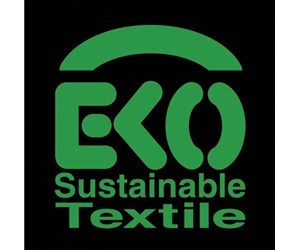
Control Union Certifications Standards:
- The natural fibres have to be organic. The standards reject any textiles which contain heavy metals, which are toxic or nondegradable. The input of additives, which harm the environment, is prohibited during the total production process, and the finished products may not contain residues or harmful means.
- CU Certifications encompass all stages of textiles production which include raw materials origin, pre-treatment (washing, bleaching, etc.), dyeing and printing, after treatment, storage, labeling of the final product and packaging.
